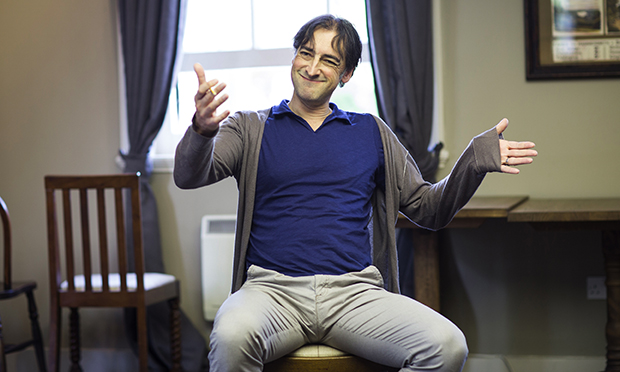
No subject, it seems, is too raw for Jonathan Maitland. After using drag to depict Margaret Thatcher in his debut play Dead Sheep this year, the journalist turned playwright is now tackling the most notorious sex abuser of recent history: Jimmy Savile. An Audience with Jimmy Savile is based on real events, uses almost verbatim dialogue, and stars the renowned impersonator and actor Alastair McGowan. While the play might sound more frightening than entertaining, Maitland insists it is an important story that needs to be heard.
Why did you set out to write play about Jimmy Savile?
I’ve been a journalist for 30 years and I think it’s an incredibly important story because of how it impacts on the way we deal with allegations of abuse, our cravenness before celebrity and the libel laws. My first instinct was to cover it journalistically on TV, but after Dead Sheep I realised you can tell a story more effectively and get to a greater truth (that’s a bit of a cliché but it’s true) by doing a dramatised form of journalism. It was a revelation to me that you can get to truth more effectively by using a little bit of drama.
What is the play’s narrative focus?
There are two bits to the narrative: a TV show with a This is Your Life-style audience, where the great and the good and famous line up to praise Savile, and he acts the fool and the clown; and the other, more important narrative is following the struggle of someone he’s abused to be believed, to be listened to and to find justice. It’s based on real life as there was a woman who tried to confront him, and this takes it to that next logical step which shows her getting an audience with him and confronting him. The play’s two key themes are: how did he get away with it, and how do you come back from the abuse and not being believed, which was for some people the worst bit. Ultimately we’re trying to make a play about forgiveness and redemption and hope and renewal, something I hope will come through very strongly by the end.
What makes theatre the right medium for tackling the subject of Jimmy Savile?
There wasn’t a camera there when young women or girls were telling their parents what happened in private. You can’t get that across in a TV documentary. At best you might have someone in silhouette talking about it. But in a play you can recreate what happened in private, which is an incredible eyeopener and gobsmacking for the audience. You can also in a play – which we have done – recreate a police interview with Savile, which happened about six years ago in which he runs rings around them. It’s an incredible gift for dramatisation and an incredible public service to bring to life the moment where he got off the hook. I think theatre’s more immediate and more in your face literally. And it can be more powerful.
How did you write the play?
It’s not 100 per cent verbatim, but if there’s such a thing as ‘part verbatim’, then it’s that. It’s based on police interview transcripts, public inquiry reports, interviews with abuse victims, YouTube – which is very useful – and books by and about him. It takes quotes from him and it’s based on real events. Some of dialogues have been imagined, though I’m very happy that he either said or could have said everything in the play.
And part of the research was that you spoke to and consulted with abuse victims?
Yes, and I’ve met with Peter Saunders, founder of NAPAC [The National Association for People Abused in Childhood]. He’s very supportive and if the show makes a profit a substantial proportion will go to his organisation. He understands what we’re trying to do and he’s called us an important part of the conversation that we need to be having about abuse.
Is it true that you have received a “tsunami of abuse” about the play?
It wasn’t a tsunami, it was more of a small trickle. But yes I got a few insults on Twitter and I engaged with them all and explained what I was doing it for, and a lot of critics became supporters once I’d explained it, which was very gratifying.
What does Alastair McGowan bring to the part of Jimmy Savile?
He’s very compelling, he’s very unnerving, he’s very skilled at portraying the full gamut of the personality: the entertaining, eccentric side, but also more importantly the horrible, nasty, dark and psychopathic side.
What do you say to people who think it is ‘too soon’ for a play about Jimmy Savile?
He died four years ago, and there’s not a flag that goes up to say right it’s now okay to do a play or TV drama about Jimmy Savile. I think you have to take the opinions of those who are most closely affected by it, and that is the victims. And the ones I’ve spoken to don’t think it’s too soon at all. In fact their only issue with timing is that this story and their stories weren’t told sooner. There have been 44 NHS reports, four police reports and God knows how many articles and documentaries, so now seems the right time to try and make sense of it all in one piece of dramatic journalism.
An Interview with Jimmy Savile is at Park Theatre, Clifton Terrace, N4 3JP from 10 June – 11 July.
